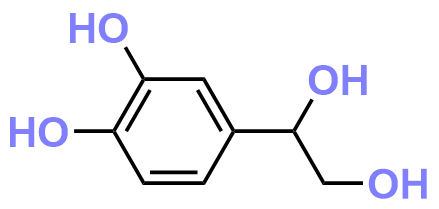3,4-Dihydroxyphenylglycol Analysis Service
- In-depth qualitative analysis of 3,4-dihydroxyphenylglycol metabolites.
- Quantitative analysis of 3,4-dihydroxyphenylglycol content.
- Establish a foundation for drug development and therapeutic enhancement.
- Animal tissue ≥ 100 mg
- Plant tissue ≥ 200 mg
- Blood ≥ 200 μL
- Urine ≥ 2 mL
3,4-Dihydroxyphenylglycol (DHPG) is a catecholamine metabolite, an important compound in biochemistry, primarily involved in the metabolic pathways of catecholamines, such as norepinephrine and epinephrine. In living organisms, the metabolism of 3,4-dihydroxyphenylglycol is typically related to the degradation of catecholamine neurotransmitters, breaking down into various metabolites including vanillylmandelic acid (VMA) and other related compounds. These metabolites are primarily excreted through urine, providing important markers for sympathetic nervous system activity. Monitoring 3,4-dihydroxyphenylglycol and its metabolites is essential for assessing neurological function and the safety of drugs affecting catecholamine metabolism. Elevated levels of 3,4-dihydroxyphenylglycol and related metabolites can indicate certain conditions, such as pheochromocytoma or other disorders of catecholamine metabolism, and may also reflect the body's response to stress or pharmacological intervention.

Figure 1. The Structure of 3,4-Dihydroxyphenylglycol
MtoZ Biolabs offers professional 3,4-dihydroxyphenylglycol analysis services, supported by a high-standard technology platform and an expert metabolomics research team, ensuring the success of your research and clinical studies by providing accurate and reliable data for drug development and neurological research.
Analysis Workflow
Service Advantages
1. High quality data: We deliver reliable and reproducible results with our advanced LC-MS system.
2. Expertise: Our experienced team of scientists ensures the quality and accuracy of our analysis.
3. Comprehensive report: We provide a detailed report including the experimental procedure, instrument parameters, and results interpretation.
4. Fast turnaround: The process from sample handling to report generation is efficient, shortening the analysis cycle.
Applications
Sample Submission Requirements
1. Sample Types
Blood, urine, tissues, and other biological samples. A minimum of three samples under the same conditions are required for each analysis.
2. Sample Volume
3. Sample Preservation
Samples should be stored at -80°C to ensure stability.
Note: Please provide detailed information on sample collection and handling.
Deliverables
1. Experimental Procedures
2. Relevant Liquid Chromatography and Mass Spectrometry Parameters
3. Detailed Information on 3,4-Dihydroxyphenylglycol
4. Raw Data
5. Custom Analysis Report
If you have any requirements for 3,4-dihydroxyphenylglycol analysis services or would like to learn more, please feel free to contact us. MtoZ Biolabs is committed to providing professional and efficient services to support the success of your research and production.
How to order?







